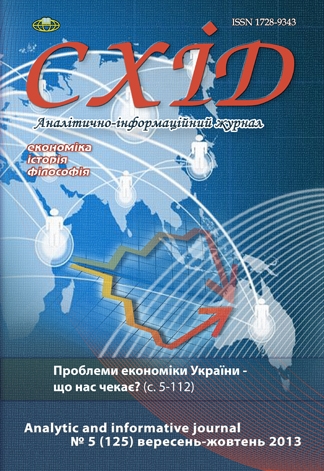Conflict between North and South Korea as expression of their differences modus of social
DOI:
https://doi.org/10.21847/1728-9343.2013.5(125).19094Keywords:
modes, sociality, ideology, North Korean society, the South Korean society, values, political components, economic components of Korea's strategyAbstract
The study examines some of the characteristic components of the Korean conflict. It is proved that the influence of ideological modus determines the significant differences in the formation of social and North and South Korea. These differences have found their place in the two areas of formation of the conflict between the two states: the ground - defining traditions, culture and values, and the top of the emerging political, social and economic differences. In addition, determining the cause of conflict between North and South Korea based on our study serves as a mode of ideology. This has created symbiosis appropriate and specific reasons for the differences in the political, economic, social and cultural life of North and South Korea. Korean society is the bearer of a specific factor that can be expressed as an inability to live in harmony and understanding, despite a century of history, culture and ideological values. Given the values and worldview of ancient Confucianism, collectivism, with their deliberate teaching to live in peace and harmony, it should be noted that the Korean peninsula has never been peace. Therefore, even today, the Korean peninsula is divided because of ideology. Contemporary culture of North Korea is a combination of extreme nationalist manifestations and attitudes "chuchhe" ideology. The task of preserving and further developing a genuine culture of the Korean people performing society and the state of the Republic of Korea, which has managed to preserve its national identity and bring in the new Korean cultural tradition and modern sense. Further development of a nation is in complete uncertainty. Modus ideology - has created differences and the reluctance to reform and give North, South and are quite satisfied with this state of affairs in the North.
Downloads
References
Асмолов К. Ученые России и Республики Корея об актуальных проблемах Корейского полуострова / К. Асмолов // Проблемы Дальнего Востока. - 2006. - № 6. - С. 123-125.
Алепко А. В. Восточный Тимор. Причина конфликта: этноконфессиональный фактор?! [Електронний ресурс] / А. В. Алепко. - Режим доступу : http://ru.apircenter.org/south-east-asia.
Воробьёв М. В. Очерки культуры Кореи / М. В. Воробьёв. - М. - СПб., 2002. - 230 c.
Ким Хен Хи: шпионка, которая пришла с Севера [Електронний ресурс]. - Режим доступу : http://www.bbc.co.uk/russian/international/2013/04/.
Основные тенденции социально-экономического и внутриполитического развития КНДР / [отв. ред. А. Н. Федоровский]. - М. : ИМЕМО РАН, 2012. - 64 с.
Петров Л. Печальный юбилей: 60-лет раскола Кореи на Север и Юг. [Електронний ресурс] / Л. Петров. - Режим доступу : http://www.north-korea.narod.ru/60_Jubilee_ROK_DPRK.htm.
Філоненко М. М. Конфліктне спілкування [Електронний ресурс] / М. М. Філоненко. - Режим доступу : http://pidruchniki.ws/15660212/psihologiya.
Шараев П. С. Социально-политические системы государств корейского полуострова / П. С. Шараев. - Томск : Изд-во Томского политехнического университета, 2009. - 129 с.
Amanda Briney. Tensions and Conflict on the Korean Peninsula [Електронний ресурс]. - Режим доступу : http://geography.about.com/od/northkorea/a/korean-conflict.htm.
Jung-Bin Kwak. Central planning of North Korea and Market economy of South Korea [Електронний ресурс]. - Режим доступу : http://econc10.bu.edu/economic.
Haksoon Yim. Cultural identity and cultural policy in South Korea [Електронний ресурс]. - Режим доступу : http://unpan1.un.org/intradoc/.
Park Chung Hee. Modernization of man, economization of life (New Year's message for 1968) // Burn Shik, Shin, ed, Major Speeches by Korea's Park Chung Hee (Hollym Corporation, Seoul), pp. 121-140.
Paul Chamberlin. Toward a Unified Korea: Transforming Two Cultures into One [Електронний ресурс]. - Режим доступу : http://www.worldandi.com/subscribers/feature_detail.asp?num =24469.
REFERENCES
Asmolov K. (2006), Scientists Russia and the Republic of Korea on the actual problems of the Korean Peninsula, Problems of the Far East, № 6, pp. 123-125 (rus).
Alepko A. V., East Timor. The cause of the conflict: ethno-religious factor?, available at: http://ru.apircenter.org/south-east-asia (rus).
Vorobyov M. (2002), Essays on Korean culture, St. Petersburg, 230 p. (rus).
Kim Hyun Hee: spy who came from the North, available at: ttp://www.bbc.co.uk/russian/international/2013/04/ (rus).
Fedorovskiy A. N. (ed.) (2012), Main trends of socio-economic and political development DPRK, IMEM Sciences, Moscow, 64 p. (rus).
Petrov L., Sad anniversary: 60 years of division of Korea into North and South, available at: http://www.north-korea.narod.ru/60_Jubilee_ROK_DPRK.htm (rus).
Filonenko M. M., Conflict communication, available at: http://pidruchniki.ws/15660212/psihologiya (ukr).
Sharayev P. S. (2009), Social and political systems of the Korean Peninsula, Tomsk, 129 p. (rus).
Amanda Briney, Tensions and Conflict on the Korean Peninsula, available at: http://geography.about.com/od/northkorea/a/korean-conflict.htm (engl).
Jung-Bin Kwak, Central planning of North Korea and Market economy of South Korea, available at: http://econc10.bu.edu/economic (engl).
Haksoon Yim, Cultural identity and cultural policy in South Korea, available at: http://unpan1.un.org/intradoc/ (engl).
Park Chung Hee (2007), Modernization of man, economization of life (New Year’s message for 1968), in: Burn Shik, Shin, ed, Major Speeches by Korea’s Park Chung Hee, Seoul, pp. 121–140 (engl).
Paul Chamberlin, Toward a Unified Korea: Transforming Two Cultures into One, available at: http://www.worldandi.com/subscribers/feature_detail.asp?num=24469 (engl).
Downloads
Published
How to Cite
Issue
Section
License
Copyright (c) 2013 Igor Semenyuk

This work is licensed under a Creative Commons Attribution-NonCommercial-NoDerivatives 4.0 International License.
1. Authors bear responsibility for the accuracy of facts, quotations, numbers and names used.
2. Manuscripts are not sent back.
3. The publisher does not always agree with the authors' opinion.
4. The authors reserve the right to authorship of the work and pass the first publication right of this work to the journal under the terms of a Creative Commons Attribution-NonCommercial-NoDerivatives 4.0 International License. This license allows others to distribute (copy) the published work for non-commercial purposes, provided there is mandatory attribution to its authors and a link to the first publication in our journal.
5. The authors have the right to conclude separate supplement agreements that relate to non-exclusive work distribution in the form in which it has been published by the journal (for example, to upload the work to the online storage of the journal or publish it as part of a monograph), provided that the reference to the first publication of the work in this journal is included.

